ACC 301 Accounting Theory & Contemporary Issues: Framework Report
VerifiedAdded on 2023/04/21
|7
|1291
|180
Report
AI Summary
This report provides an analysis of the revised (2018) conceptual framework for financial reporting as finalized by the International Accounting Standards Board (IASB). It addresses key questions related to the purpose of the conceptual framework, its advantages and criticisms, the major objectives of general purpose financial reporting (GPFR), and the role of professional judgment and prudence in financial reporting. The report also discusses the concept of substance over form and its importance in faithful representation, ultimately agreeing with the board's decision to explicitly include this concept in the conceptual framework. It references various academic sources to support its analysis and conclusions.
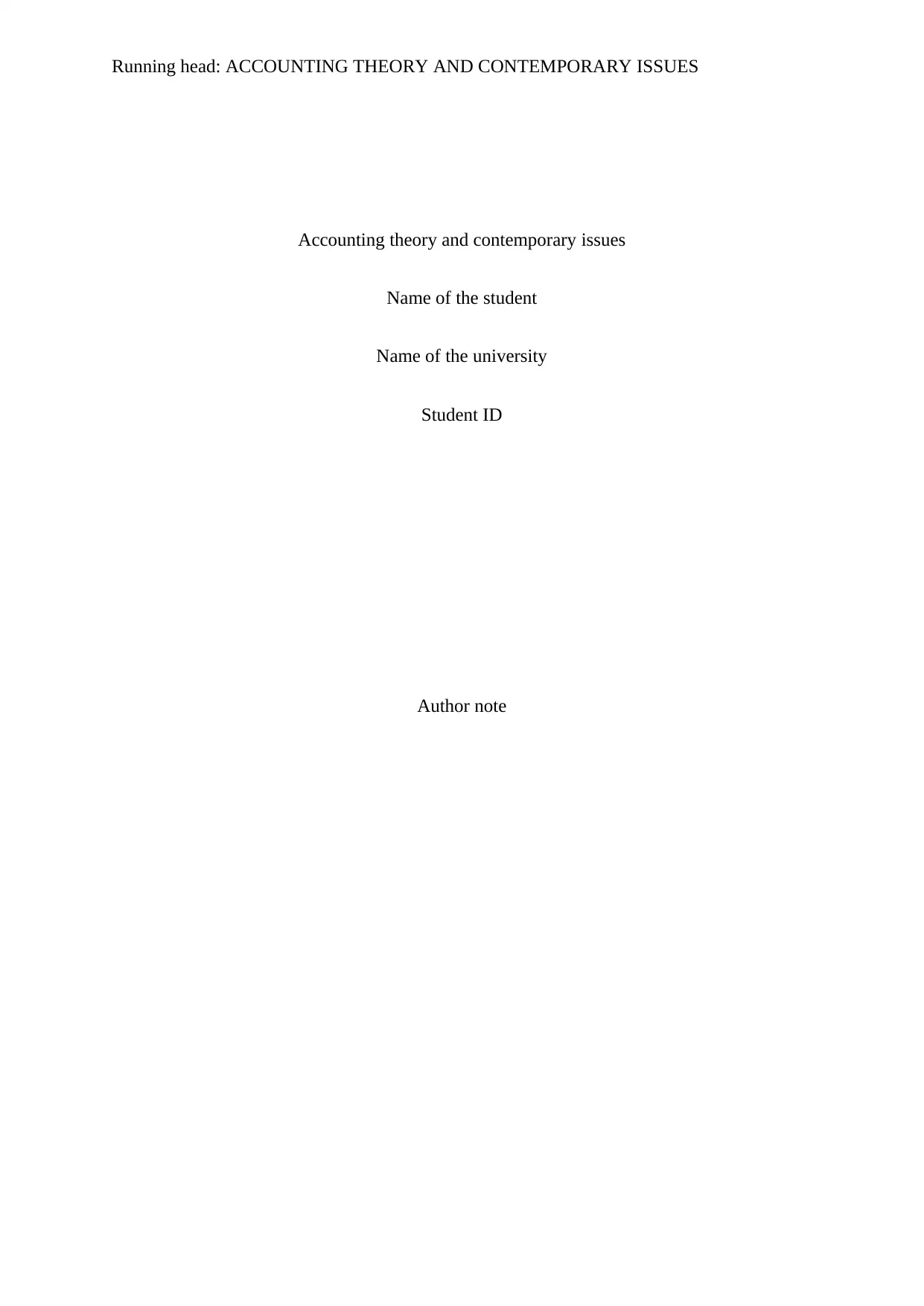
Running head: ACCOUNTING THEORY AND CONTEMPORARY ISSUES
Accounting theory and contemporary issues
Name of the student
Name of the university
Student ID
Author note
Accounting theory and contemporary issues
Name of the student
Name of the university
Student ID
Author note
Paraphrase This Document
Need a fresh take? Get an instant paraphrase of this document with our AI Paraphraser
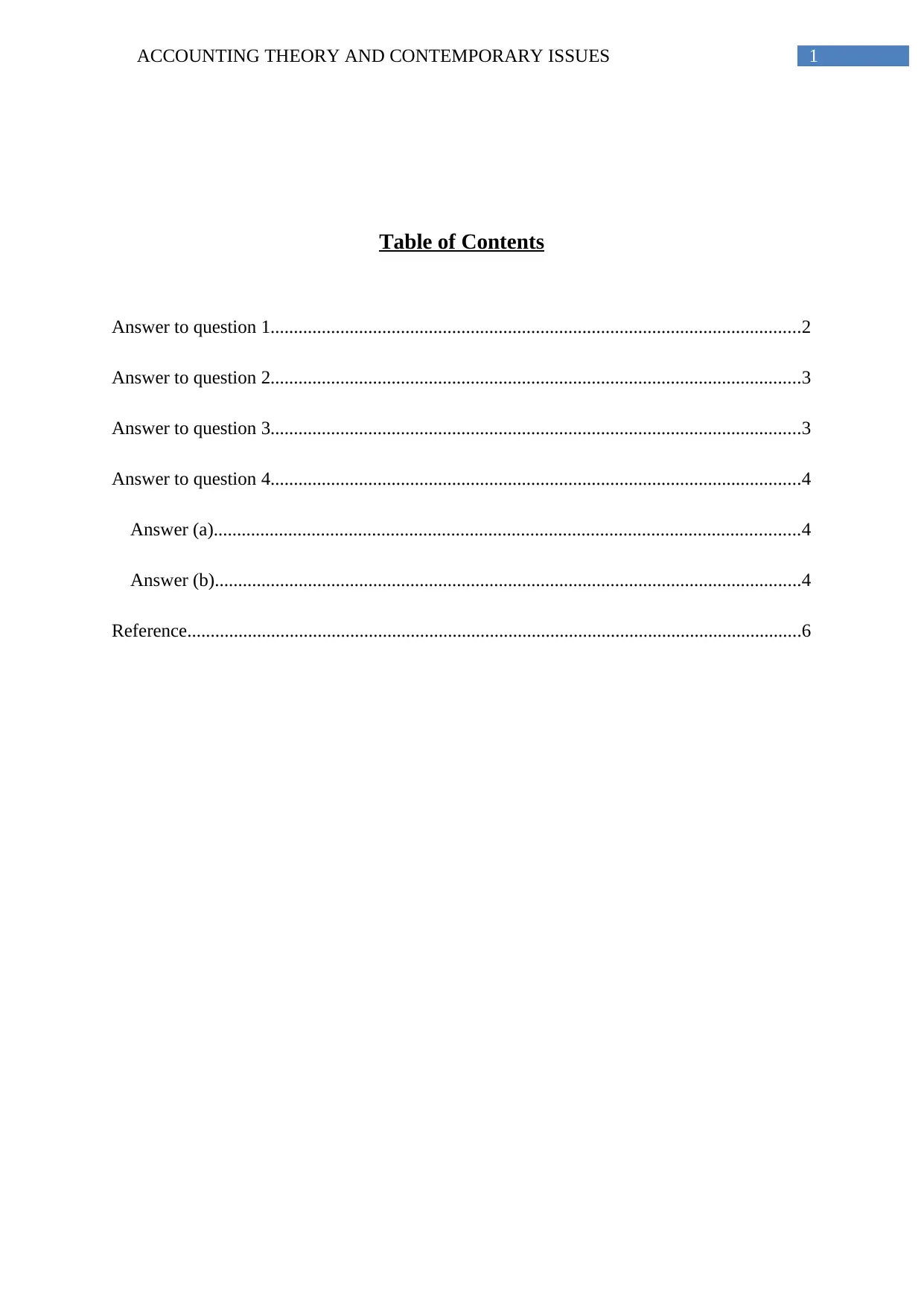
1ACCOUNTING THEORY AND CONTEMPORARY ISSUES
Table of Contents
Answer to question 1..................................................................................................................2
Answer to question 2..................................................................................................................3
Answer to question 3..................................................................................................................3
Answer to question 4..................................................................................................................4
Answer (a)..............................................................................................................................4
Answer (b)..............................................................................................................................4
Reference....................................................................................................................................6
Table of Contents
Answer to question 1..................................................................................................................2
Answer to question 2..................................................................................................................3
Answer to question 3..................................................................................................................3
Answer to question 4..................................................................................................................4
Answer (a)..............................................................................................................................4
Answer (b)..............................................................................................................................4
Reference....................................................................................................................................6
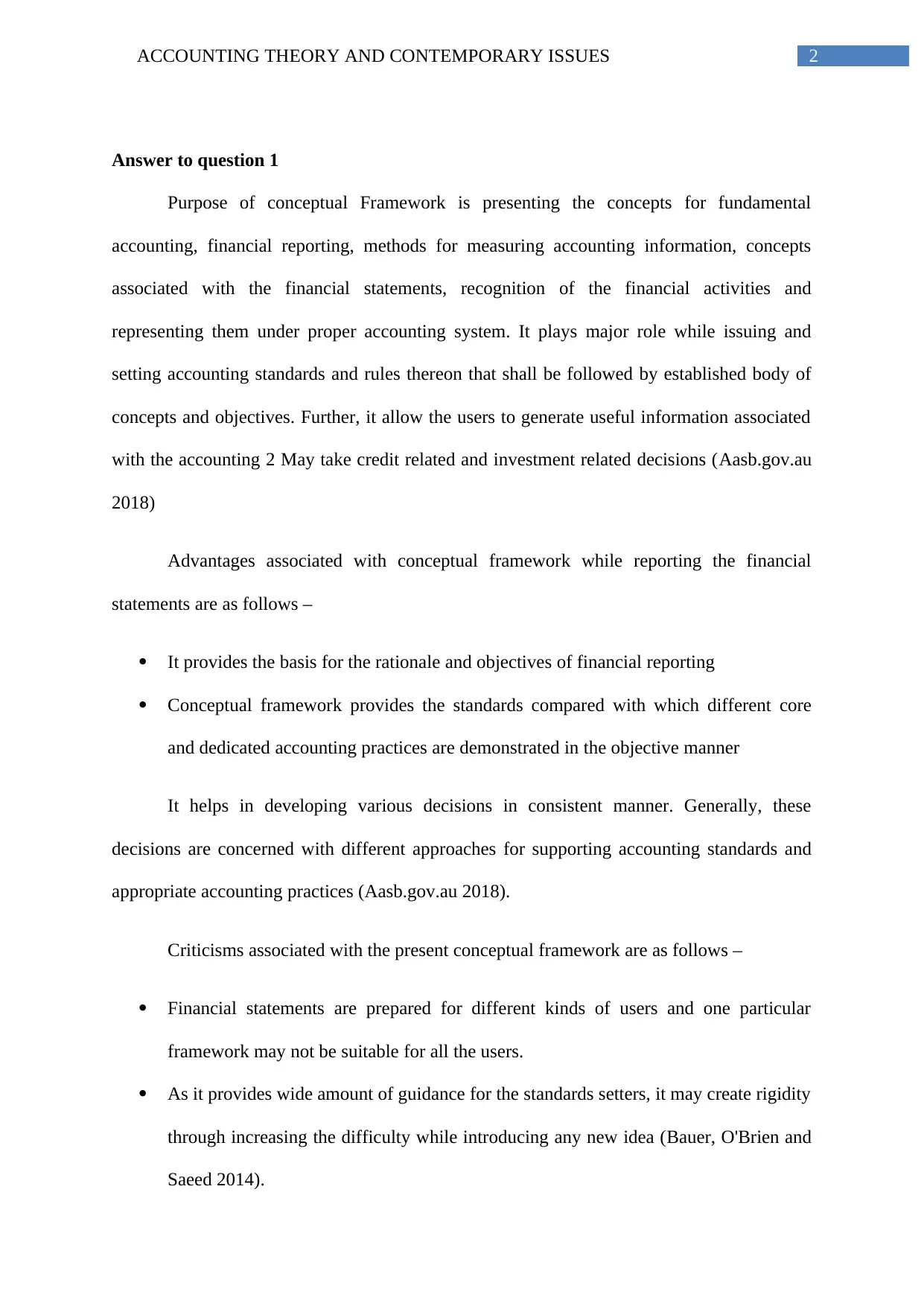
2ACCOUNTING THEORY AND CONTEMPORARY ISSUES
Answer to question 1
Purpose of conceptual Framework is presenting the concepts for fundamental
accounting, financial reporting, methods for measuring accounting information, concepts
associated with the financial statements, recognition of the financial activities and
representing them under proper accounting system. It plays major role while issuing and
setting accounting standards and rules thereon that shall be followed by established body of
concepts and objectives. Further, it allow the users to generate useful information associated
with the accounting 2 May take credit related and investment related decisions (Aasb.gov.au
2018)
Advantages associated with conceptual framework while reporting the financial
statements are as follows –
It provides the basis for the rationale and objectives of financial reporting
Conceptual framework provides the standards compared with which different core
and dedicated accounting practices are demonstrated in the objective manner
It helps in developing various decisions in consistent manner. Generally, these
decisions are concerned with different approaches for supporting accounting standards and
appropriate accounting practices (Aasb.gov.au 2018).
Criticisms associated with the present conceptual framework are as follows –
Financial statements are prepared for different kinds of users and one particular
framework may not be suitable for all the users.
As it provides wide amount of guidance for the standards setters, it may create rigidity
through increasing the difficulty while introducing any new idea (Bauer, O'Brien and
Saeed 2014).
Answer to question 1
Purpose of conceptual Framework is presenting the concepts for fundamental
accounting, financial reporting, methods for measuring accounting information, concepts
associated with the financial statements, recognition of the financial activities and
representing them under proper accounting system. It plays major role while issuing and
setting accounting standards and rules thereon that shall be followed by established body of
concepts and objectives. Further, it allow the users to generate useful information associated
with the accounting 2 May take credit related and investment related decisions (Aasb.gov.au
2018)
Advantages associated with conceptual framework while reporting the financial
statements are as follows –
It provides the basis for the rationale and objectives of financial reporting
Conceptual framework provides the standards compared with which different core
and dedicated accounting practices are demonstrated in the objective manner
It helps in developing various decisions in consistent manner. Generally, these
decisions are concerned with different approaches for supporting accounting standards and
appropriate accounting practices (Aasb.gov.au 2018).
Criticisms associated with the present conceptual framework are as follows –
Financial statements are prepared for different kinds of users and one particular
framework may not be suitable for all the users.
As it provides wide amount of guidance for the standards setters, it may create rigidity
through increasing the difficulty while introducing any new idea (Bauer, O'Brien and
Saeed 2014).
⊘ This is a preview!⊘
Do you want full access?
Subscribe today to unlock all pages.

Trusted by 1+ million students worldwide
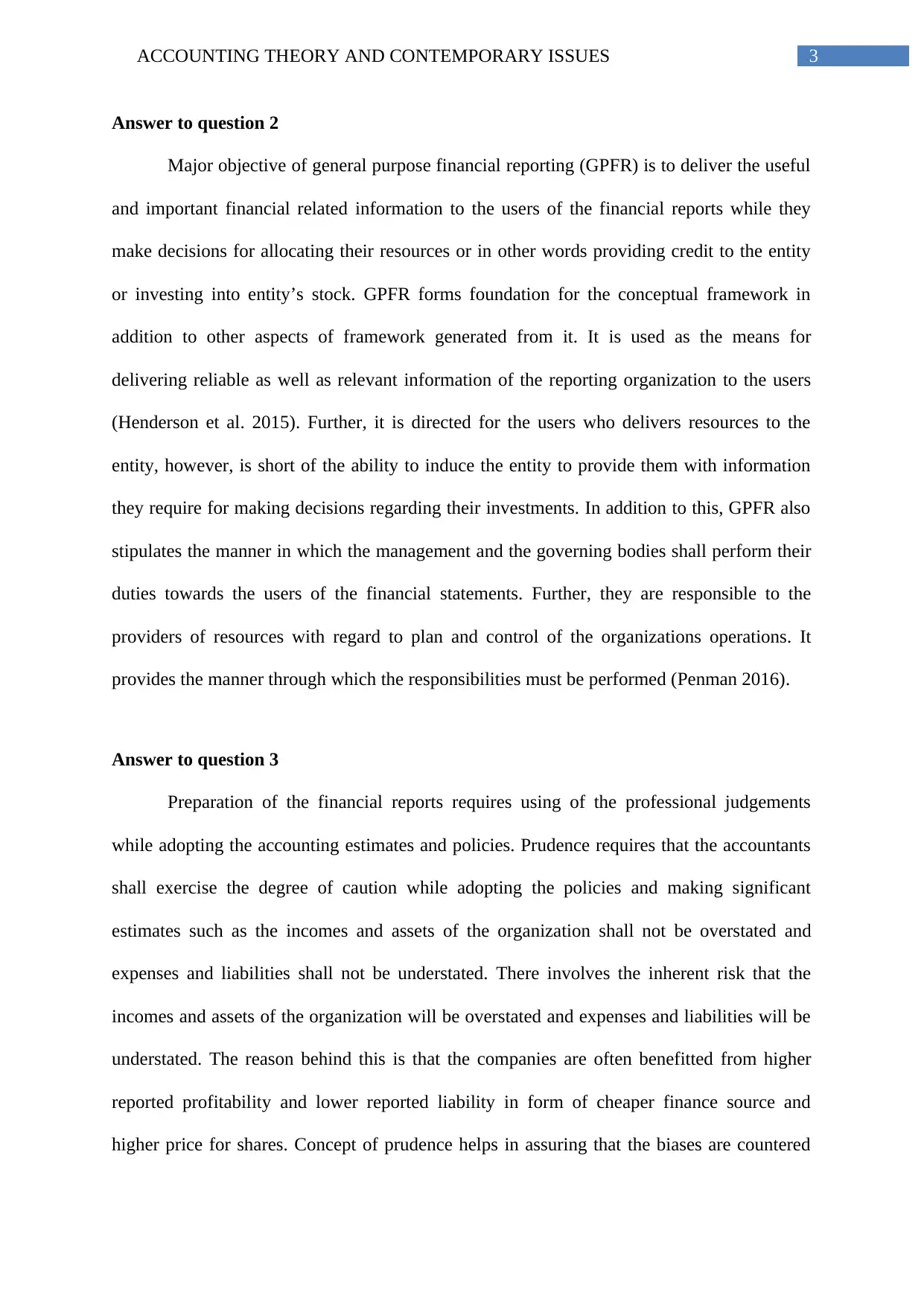
3ACCOUNTING THEORY AND CONTEMPORARY ISSUES
Answer to question 2
Major objective of general purpose financial reporting (GPFR) is to deliver the useful
and important financial related information to the users of the financial reports while they
make decisions for allocating their resources or in other words providing credit to the entity
or investing into entity’s stock. GPFR forms foundation for the conceptual framework in
addition to other aspects of framework generated from it. It is used as the means for
delivering reliable as well as relevant information of the reporting organization to the users
(Henderson et al. 2015). Further, it is directed for the users who delivers resources to the
entity, however, is short of the ability to induce the entity to provide them with information
they require for making decisions regarding their investments. In addition to this, GPFR also
stipulates the manner in which the management and the governing bodies shall perform their
duties towards the users of the financial statements. Further, they are responsible to the
providers of resources with regard to plan and control of the organizations operations. It
provides the manner through which the responsibilities must be performed (Penman 2016).
Answer to question 3
Preparation of the financial reports requires using of the professional judgements
while adopting the accounting estimates and policies. Prudence requires that the accountants
shall exercise the degree of caution while adopting the policies and making significant
estimates such as the incomes and assets of the organization shall not be overstated and
expenses and liabilities shall not be understated. There involves the inherent risk that the
incomes and assets of the organization will be overstated and expenses and liabilities will be
understated. The reason behind this is that the companies are often benefitted from higher
reported profitability and lower reported liability in form of cheaper finance source and
higher price for shares. Concept of prudence helps in assuring that the biases are countered
Answer to question 2
Major objective of general purpose financial reporting (GPFR) is to deliver the useful
and important financial related information to the users of the financial reports while they
make decisions for allocating their resources or in other words providing credit to the entity
or investing into entity’s stock. GPFR forms foundation for the conceptual framework in
addition to other aspects of framework generated from it. It is used as the means for
delivering reliable as well as relevant information of the reporting organization to the users
(Henderson et al. 2015). Further, it is directed for the users who delivers resources to the
entity, however, is short of the ability to induce the entity to provide them with information
they require for making decisions regarding their investments. In addition to this, GPFR also
stipulates the manner in which the management and the governing bodies shall perform their
duties towards the users of the financial statements. Further, they are responsible to the
providers of resources with regard to plan and control of the organizations operations. It
provides the manner through which the responsibilities must be performed (Penman 2016).
Answer to question 3
Preparation of the financial reports requires using of the professional judgements
while adopting the accounting estimates and policies. Prudence requires that the accountants
shall exercise the degree of caution while adopting the policies and making significant
estimates such as the incomes and assets of the organization shall not be overstated and
expenses and liabilities shall not be understated. There involves the inherent risk that the
incomes and assets of the organization will be overstated and expenses and liabilities will be
understated. The reason behind this is that the companies are often benefitted from higher
reported profitability and lower reported liability in form of cheaper finance source and
higher price for shares. Concept of prudence helps in assuring that the biases are countered
Paraphrase This Document
Need a fresh take? Get an instant paraphrase of this document with our AI Paraphraser
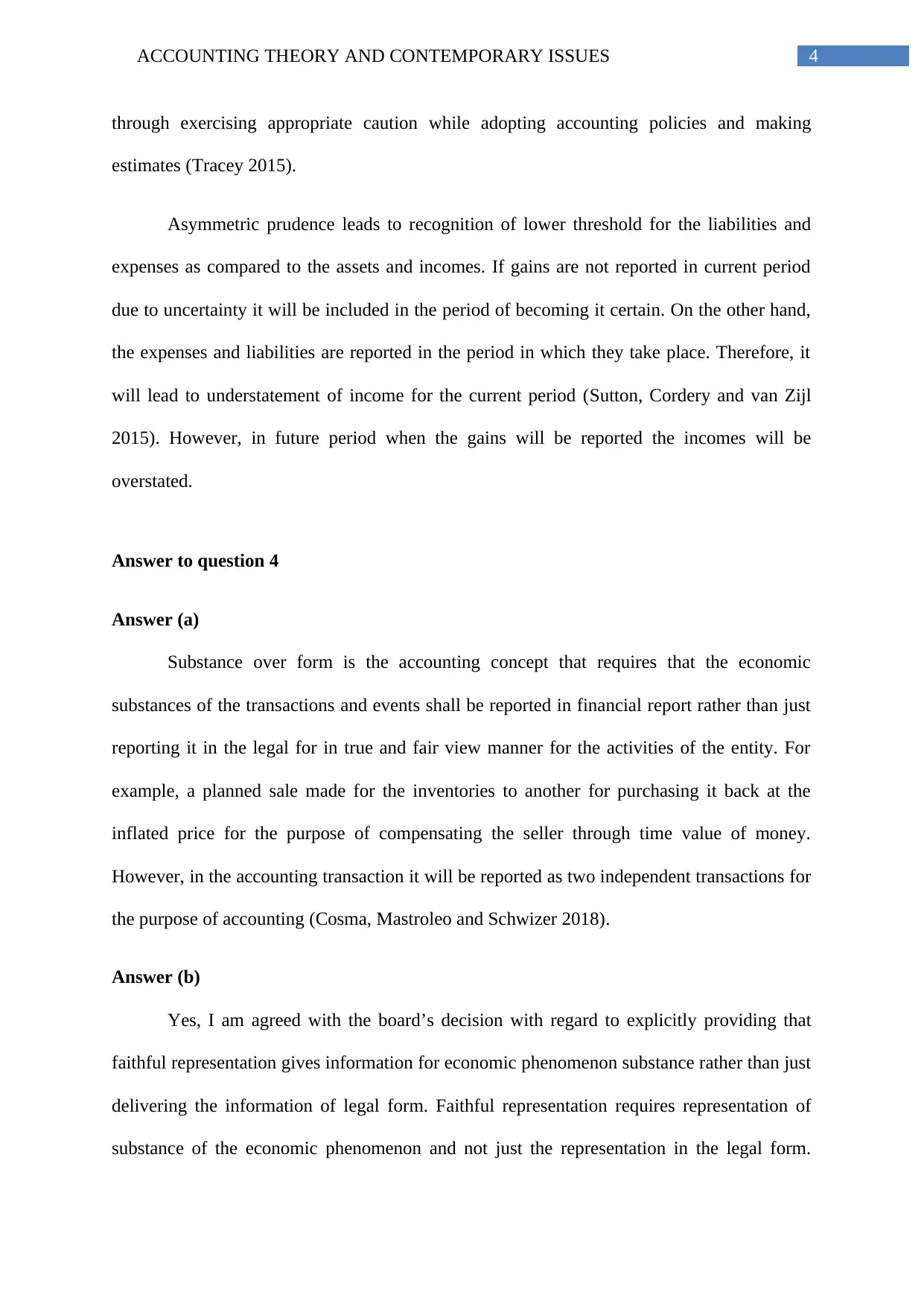
4ACCOUNTING THEORY AND CONTEMPORARY ISSUES
through exercising appropriate caution while adopting accounting policies and making
estimates (Tracey 2015).
Asymmetric prudence leads to recognition of lower threshold for the liabilities and
expenses as compared to the assets and incomes. If gains are not reported in current period
due to uncertainty it will be included in the period of becoming it certain. On the other hand,
the expenses and liabilities are reported in the period in which they take place. Therefore, it
will lead to understatement of income for the current period (Sutton, Cordery and van Zijl
2015). However, in future period when the gains will be reported the incomes will be
overstated.
Answer to question 4
Answer (a)
Substance over form is the accounting concept that requires that the economic
substances of the transactions and events shall be reported in financial report rather than just
reporting it in the legal for in true and fair view manner for the activities of the entity. For
example, a planned sale made for the inventories to another for purchasing it back at the
inflated price for the purpose of compensating the seller through time value of money.
However, in the accounting transaction it will be reported as two independent transactions for
the purpose of accounting (Cosma, Mastroleo and Schwizer 2018).
Answer (b)
Yes, I am agreed with the board’s decision with regard to explicitly providing that
faithful representation gives information for economic phenomenon substance rather than just
delivering the information of legal form. Faithful representation requires representation of
substance of the economic phenomenon and not just the representation in the legal form.
through exercising appropriate caution while adopting accounting policies and making
estimates (Tracey 2015).
Asymmetric prudence leads to recognition of lower threshold for the liabilities and
expenses as compared to the assets and incomes. If gains are not reported in current period
due to uncertainty it will be included in the period of becoming it certain. On the other hand,
the expenses and liabilities are reported in the period in which they take place. Therefore, it
will lead to understatement of income for the current period (Sutton, Cordery and van Zijl
2015). However, in future period when the gains will be reported the incomes will be
overstated.
Answer to question 4
Answer (a)
Substance over form is the accounting concept that requires that the economic
substances of the transactions and events shall be reported in financial report rather than just
reporting it in the legal for in true and fair view manner for the activities of the entity. For
example, a planned sale made for the inventories to another for purchasing it back at the
inflated price for the purpose of compensating the seller through time value of money.
However, in the accounting transaction it will be reported as two independent transactions for
the purpose of accounting (Cosma, Mastroleo and Schwizer 2018).
Answer (b)
Yes, I am agreed with the board’s decision with regard to explicitly providing that
faithful representation gives information for economic phenomenon substance rather than just
delivering the information of legal form. Faithful representation requires representation of
substance of the economic phenomenon and not just the representation in the legal form.
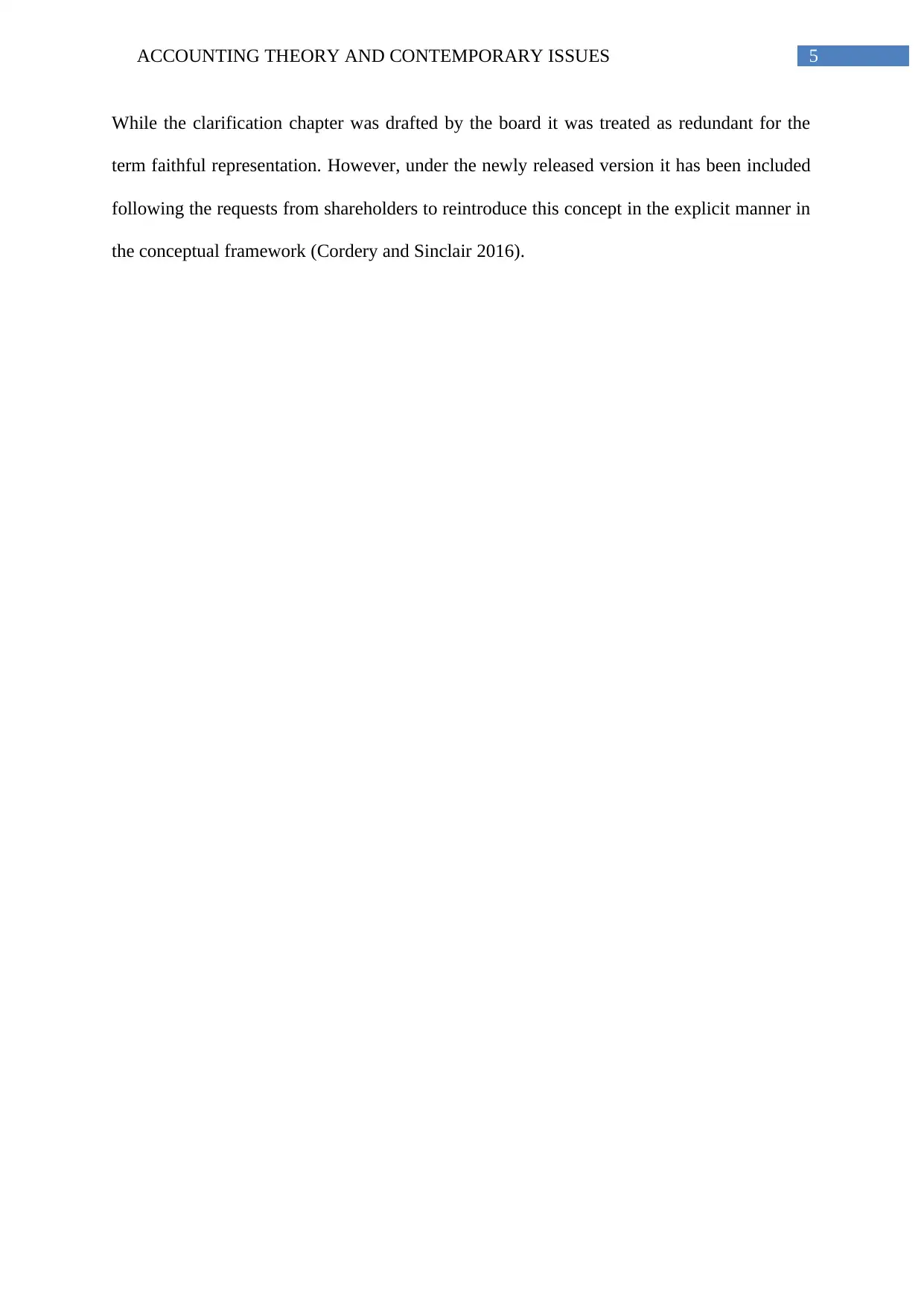
5ACCOUNTING THEORY AND CONTEMPORARY ISSUES
While the clarification chapter was drafted by the board it was treated as redundant for the
term faithful representation. However, under the newly released version it has been included
following the requests from shareholders to reintroduce this concept in the explicit manner in
the conceptual framework (Cordery and Sinclair 2016).
While the clarification chapter was drafted by the board it was treated as redundant for the
term faithful representation. However, under the newly released version it has been included
following the requests from shareholders to reintroduce this concept in the explicit manner in
the conceptual framework (Cordery and Sinclair 2016).
⊘ This is a preview!⊘
Do you want full access?
Subscribe today to unlock all pages.

Trusted by 1+ million students worldwide
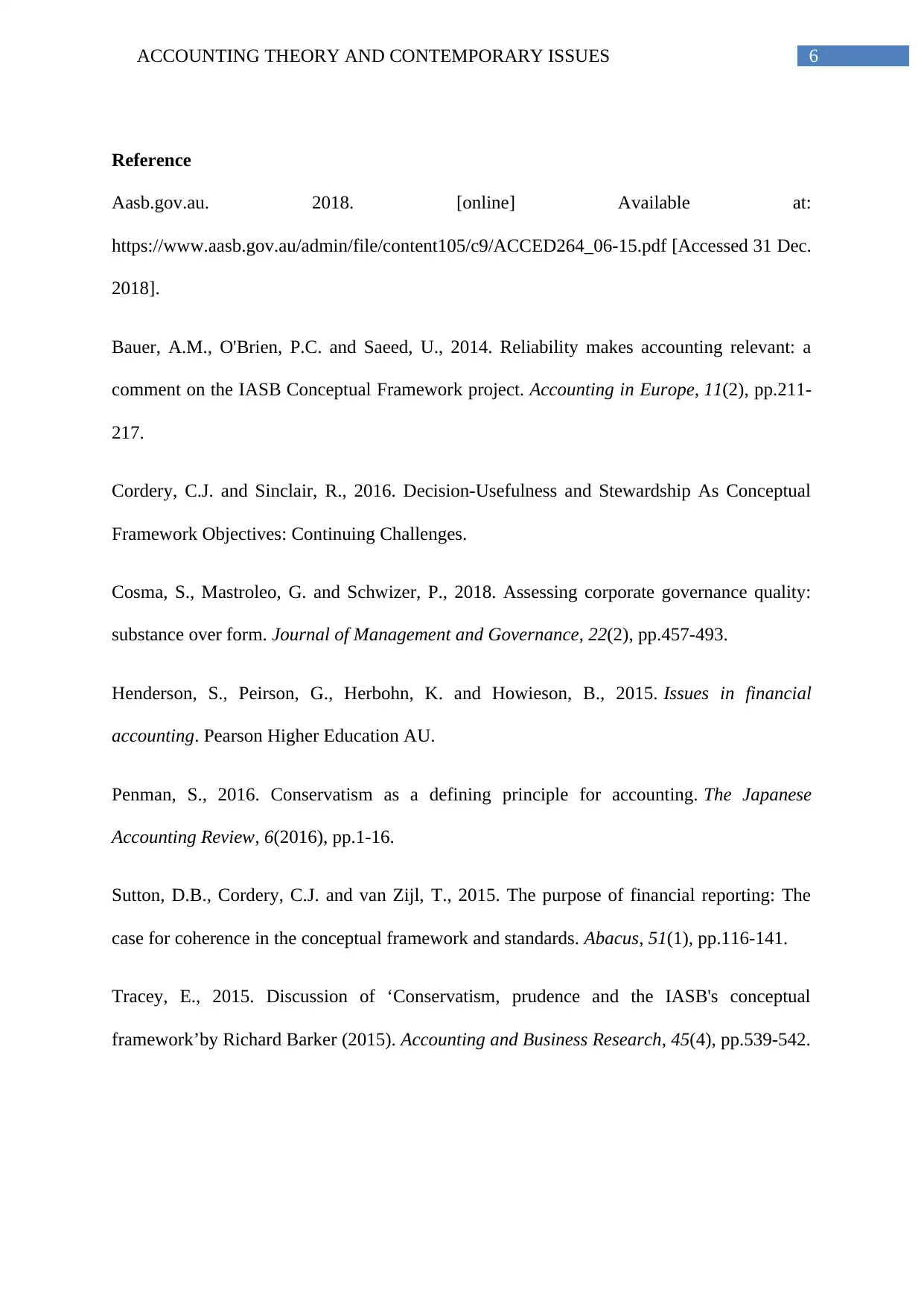
6ACCOUNTING THEORY AND CONTEMPORARY ISSUES
Reference
Aasb.gov.au. 2018. [online] Available at:
https://www.aasb.gov.au/admin/file/content105/c9/ACCED264_06-15.pdf [Accessed 31 Dec.
2018].
Bauer, A.M., O'Brien, P.C. and Saeed, U., 2014. Reliability makes accounting relevant: a
comment on the IASB Conceptual Framework project. Accounting in Europe, 11(2), pp.211-
217.
Cordery, C.J. and Sinclair, R., 2016. Decision-Usefulness and Stewardship As Conceptual
Framework Objectives: Continuing Challenges.
Cosma, S., Mastroleo, G. and Schwizer, P., 2018. Assessing corporate governance quality:
substance over form. Journal of Management and Governance, 22(2), pp.457-493.
Henderson, S., Peirson, G., Herbohn, K. and Howieson, B., 2015. Issues in financial
accounting. Pearson Higher Education AU.
Penman, S., 2016. Conservatism as a defining principle for accounting. The Japanese
Accounting Review, 6(2016), pp.1-16.
Sutton, D.B., Cordery, C.J. and van Zijl, T., 2015. The purpose of financial reporting: The
case for coherence in the conceptual framework and standards. Abacus, 51(1), pp.116-141.
Tracey, E., 2015. Discussion of ‘Conservatism, prudence and the IASB's conceptual
framework’by Richard Barker (2015). Accounting and Business Research, 45(4), pp.539-542.
Reference
Aasb.gov.au. 2018. [online] Available at:
https://www.aasb.gov.au/admin/file/content105/c9/ACCED264_06-15.pdf [Accessed 31 Dec.
2018].
Bauer, A.M., O'Brien, P.C. and Saeed, U., 2014. Reliability makes accounting relevant: a
comment on the IASB Conceptual Framework project. Accounting in Europe, 11(2), pp.211-
217.
Cordery, C.J. and Sinclair, R., 2016. Decision-Usefulness and Stewardship As Conceptual
Framework Objectives: Continuing Challenges.
Cosma, S., Mastroleo, G. and Schwizer, P., 2018. Assessing corporate governance quality:
substance over form. Journal of Management and Governance, 22(2), pp.457-493.
Henderson, S., Peirson, G., Herbohn, K. and Howieson, B., 2015. Issues in financial
accounting. Pearson Higher Education AU.
Penman, S., 2016. Conservatism as a defining principle for accounting. The Japanese
Accounting Review, 6(2016), pp.1-16.
Sutton, D.B., Cordery, C.J. and van Zijl, T., 2015. The purpose of financial reporting: The
case for coherence in the conceptual framework and standards. Abacus, 51(1), pp.116-141.
Tracey, E., 2015. Discussion of ‘Conservatism, prudence and the IASB's conceptual
framework’by Richard Barker (2015). Accounting and Business Research, 45(4), pp.539-542.
1 out of 7
Related Documents
Your All-in-One AI-Powered Toolkit for Academic Success.
+13062052269
info@desklib.com
Available 24*7 on WhatsApp / Email
![[object Object]](/_next/static/media/star-bottom.7253800d.svg)
Unlock your academic potential
Copyright © 2020–2025 A2Z Services. All Rights Reserved. Developed and managed by ZUCOL.




